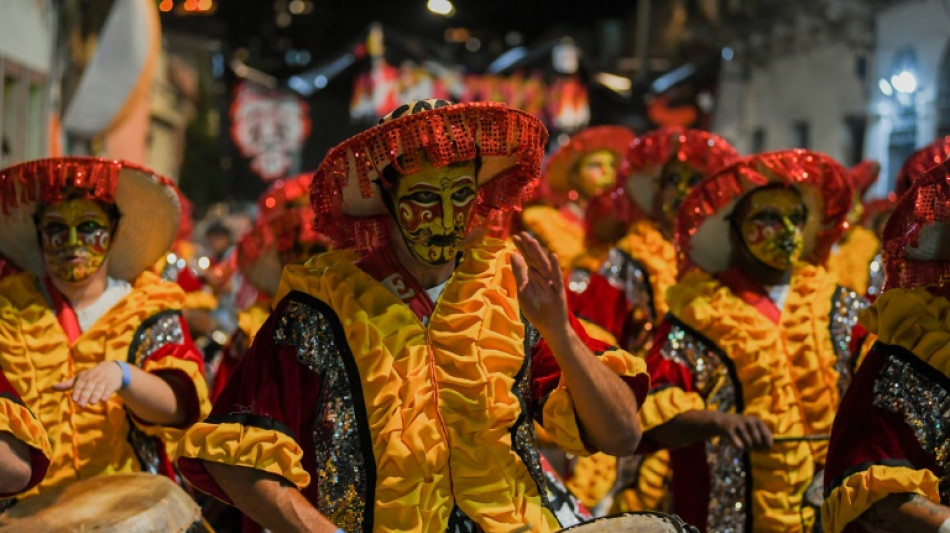
-
 Snowstorm blankets US northeast as New York sees travel ban
Snowstorm blankets US northeast as New York sees travel ban
-
Healthcare crisis looms over Greenland's isolated villages

-
 Hodgkinson says breaking 800m record would put her among athletics' greatest
Hodgkinson says breaking 800m record would put her among athletics' greatest
-
Two Russian security personnel were on board France-seized tanker: sources

-
 EU puts US trade deal on ice after Supreme Court ruling
EU puts US trade deal on ice after Supreme Court ruling
-
Hetmyer blasts 85 as West Indies pile up 254-6 against Zimbabwe

-
 Canada PM heads to Asia seeking new trade partners as US ties fray
Canada PM heads to Asia seeking new trade partners as US ties fray
-
South Africa accepts Trump's new US ambassador

-
 Iraq's Maliki defends PM candidacy, seeks to reassure US
Iraq's Maliki defends PM candidacy, seeks to reassure US
-
UEFA suspend Benfica's Prestianni after alleged racist abuse

-
 Jetten sworn in as youngest-ever Dutch PM
Jetten sworn in as youngest-ever Dutch PM
-
Italy's Enel to invest 20bn euros in renewables by 2028

-
 BBC apologises for 'involuntary' Tourette's racial slur during BAFTA awards
BBC apologises for 'involuntary' Tourette's racial slur during BAFTA awards
-
Kristen Bell returns to host glitzy Actor Awards in Hollywood

-
 Iran says would respond 'ferociously' to any US attack
Iran says would respond 'ferociously' to any US attack
-
Venezuelan foreign minister demands 'immediate release' of Maduro

-
 Dane Vingegaard to start season at Paris-Nice in March
Dane Vingegaard to start season at Paris-Nice in March
-
Australia PM backs removing UK's Andrew from line of succession

-
 Where do Ukraine and Russia stand after four years of war?
Where do Ukraine and Russia stand after four years of war?
-
Police investigating racist abuse of Premier League quartet

-
 Fiji to start Nations Championship at 'home' to Wales in Cardiff
Fiji to start Nations Championship at 'home' to Wales in Cardiff
-
EU lawmakers to put US trade deal on hold after Supreme Court ruling

-
 Rubio to attend Caribbean summit as US presses Venezuela, Cuba
Rubio to attend Caribbean summit as US presses Venezuela, Cuba
-
'Ugly' England aim to spin their way to T20 World Cup semi-finals

-
 Nigeria paid Boko Haram ransom for kidnapped pupils: intel sources
Nigeria paid Boko Haram ransom for kidnapped pupils: intel sources
-
Tudor says Tottenham can still beat the drop despite Arsenal loss

-
 Violence sweeps Mexico after most-wanted drug cartel leader killed
Violence sweeps Mexico after most-wanted drug cartel leader killed
-
France giant Meafou capable of being 'world's best' lock

-
 Stocks diverge, dollar down over Trump tariffs uncertainty
Stocks diverge, dollar down over Trump tariffs uncertainty
-
World champions South Africa announce eight home Tests for 2026/27

-
 Liverpool boss Slot encouraged by Mac Allister's return to form
Liverpool boss Slot encouraged by Mac Allister's return to form
-
India replaces British architect statue with independence hero
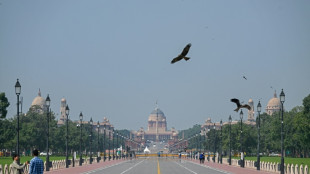
-
 Pakistan warn England's flaky batting to expect a trial by spin
Pakistan warn England's flaky batting to expect a trial by spin
-
Philippines' Duterte authorised murders, ICC told as hearings open

-
 Iran says would respond 'ferociously' to any US attack, even limited strikes
Iran says would respond 'ferociously' to any US attack, even limited strikes
-
New Dutch government sworn in under centrist Jetten

-
 What the future holds for the CJNG cartel after leader killed
What the future holds for the CJNG cartel after leader killed
-
ICC kicks off pre-trial hearing over Philippines' Duterte

-
 UN chief decries global rise of 'rule of force'
UN chief decries global rise of 'rule of force'
-
Nemesio Oseguera, the brutal Mexican drug lord known as 'El Mencho'
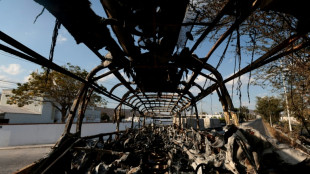
-
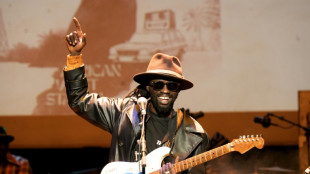 Senegal's Sahad, radiant champion of 'musical pan-Africanism'
Senegal's Sahad, radiant champion of 'musical pan-Africanism'
-
New York orders citywide travel ban as major storm hits US

-
 'Considered a traitor': Life of an anti-war Ukrainian in Russia
'Considered a traitor': Life of an anti-war Ukrainian in Russia
-
South Korea and Brazil sign deals on K-beauty, trade

-
 Zimbabwe farmers seek US help over long-promised payouts
Zimbabwe farmers seek US help over long-promised payouts
-
Hong Kong appeals court upholds jailing of 12 democracy campaigners
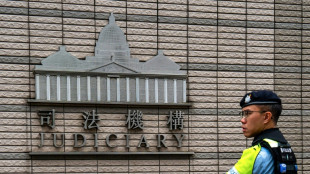
-
 India battle for World Cup survival after 'messing up on grand scale'
India battle for World Cup survival after 'messing up on grand scale'
-
'I will go': Bengalis in Pakistan hope for family reunions
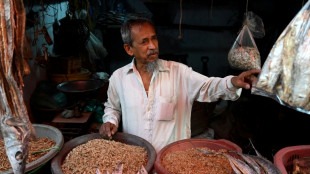
-
 North Korea touts nuclear advances as Kim re-chosen to lead ruling party
North Korea touts nuclear advances as Kim re-chosen to lead ruling party
-
South Korea protests 'Victory' banner hung from Russian embassy


Las Llamadas: Uruguayan festival born from African struggle
As a little boy, Cesar Pintos -- now 86 -- played "drums" with his friends in the streets of Montevideo's black-majority neighborhoods, beating tin cans with twigs to ancestral rhythms brought to Uruguay by enslaved Africans.
It was the 1940s, barely 100 years since the abolition of slavery in the South American country and a period of explosive growth for candombe -- a uniquely AfroUruguayan music style.
"Black people brought it here," Pintos told AFP of the music, which UNESCO recognized as a piece of Uruguayan cultural heritage "transmitted within families of African descent."
"They brought it in their heads, because they had nothing" in the line of possessions, said Pintos.
As an adult, he started his own "comparsa" of drummers and dancers from his Cordon neighborhood, one of the birthplaces of candombe.
The group, named Sarabanda, participates to this day in "Las Llamadas" -- an annual parade hailed as a celebration of African heritage and the highlight of Montevideo's carnival.
Las Llamadas translates as "The Calls," from the ancient practice of beating drums to "call" the community together.
Every year since 1956, dozens of comparsas march in the Montevidean city center with painted faces and elaborate costumes that hark back to a distant past on a foreign continent.
In a two-day carnival competition watched by thousands, they beat out candombe tunes on wood and animal skin drums as the performers dance.
- From 'objects' to musical stars -
Today, Las Llamadas is a celebration for all race groups -- in fact many comparsas are majority white.
But the origins of candombe music are found in black struggle.
Montevideo was an important entry port for enslaved Africans brought by Europeans to South America from the second half of the 18th century.
By the end of the 1700s, over a third of the capital's population were African descendents, according to the municipal website.
For generations of enslaved people and their offspring, drumming and dancing in their free time was a way to hold on to distant ties to the mother continent.
When slavery was abolished in Uruguay in the mid 19th century, AfroUruguayans created mutual aid societies, whose lively meetings gave birth to candombe.
- 'Fundamental' -
"The drum for us is fundamental... It allows us to protest when we need to make ourselves heard, and also to have fun," Alfonso Pintos, the 59-year-old son of Cesar, told AFP.
He pointed to the role of comparsas in drumming up Uruguayan resistance to apartheid in South Africa, and closer to home, the country's own military dictatorship of the 1970s and 1980s that displaced many black Montevideans.
Today, Las Llamadas is more party than protest, but the fight for equality is not over.
According to the World Bank, Uruguay stands out in Latin America for its low level of inequality, though black people are more likely to be poor.
The last inequality report by the government's INE statistics institute reported in 2014 that more than half of Afrodescencents did not have their basic needs met, compared to less than a third of whites.
Nine in ten AfroUruguayans aged 20 to 24 do not obtain a tertiary education.
- True to its roots? -
Just over 255,000 people out of about 3.2 million Uruguayans identified as Afrodescendents in the last census.
It is a shrinking ratio of the population -- about 8.0 percent compared to more than a third 200 years ago.
"Uruguay really took very seriously the idea of trying to become a white nation," mainly by encouraging European migration, said historian George Reid Andrews, author of the book "Blackness in the White Nation."
For many AfroUruguayans, candombe is a cherished inheritance.
Alfonso Pintos, a woodworker by trade, has taken over Sarabanda from dad Cesar, who still makes guest appearances with the troupe.
Cesar's grandson Pablo, 34, is the drumming coordinator and granddaughter Micaela, 29, the lead dancer.
Seven-year-old Catalina, Cesar's great-granddaughter, is already preparing to become a fourth generation performer.
But some feel candombe is no longer true to its roots.
Tomas Chirimini is president of the Africania civic association and leader of the performing troupe Conjunto Bantu, which does not participate in Las Llamadas or carnival.
"The black (Uruguayan) has lost a place to express his heritage," Chirimini, 84, told AFP, referring to what he perceives as a creeping commercialization and watering-down of AfroUruguayan culture.
Things are indeed changing, said 34-year-old Fred Parreno, a Sarabanda drummer.
But "the fundamental thing is... to be aware of what you are representing when you pick up a drum," he told AFP.
"You are representing many people who came before and who spilled their blood so that today we can walk on the street" drumming, he said.
G.AbuOdeh--SF-PST



